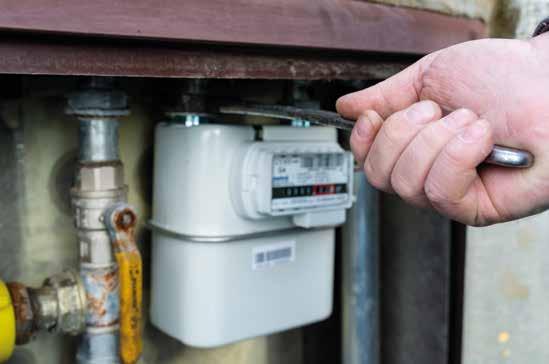
3 minute read
Meters
Become an approved meter installer
Adding to your qualifications by becoming an approved meter installer can give you new skills and provide more opportunities for your business, says Fraser Mathieson, governance services consultant at ElectraLink.
Britain has around 24 million gas meters, every one of which is owned privately, and there is an entire sector that deals with the management of meter installations. Meter asset managers (MAMs) are organisations that own and maintain meter installations and they manage and operate meters on behalf of gas suppliers.
Gas suppliers rely on safe and properly functioning gas meters to ensure that they can bill their customers for the gas they use, so using accredited MAMs and AMIs is an essential part of this nationwide activity.
The Gas Act is the primary legislation governing the competitive gas industry and places obligations on the supplier to ensure that competent persons carry out meter installations safely. In practice, suppliers contract with MAMs to operate meters, and MAMs contract with AMIs as the competent person to carry out work on metering installations. That work can include meter exchanges, new installs, regulator exchanges or other repair and maintenance work.
Competence
Most Gas Safe engineers are legally competent to work on gas meters when they hold MET1-4 qualifications – and most of you reading this will already have the competence to carry out meter work legally. However, MAMs and suppliers have a plethora of other obligations and requirements in relation to meter work that come from regulation, industry codes, codes of practice and IGEM standards.
AMI accreditation is like a bolt-on to the MET1-4 qualifications, and you can obtain it by passing a desktop audit of your processes and procedures and one on-site audit of your work – much in the same way that you prove your competence with gas. It can be an easy addition to your existing qualifications.
There are costs attached to becoming an accredited AMI but it can open doors to work with MAMs and other asset management companies. It can also lead to work with housing developers that want to install gas meters to be adopted later by MAMs and suppliers once a development is complete – something that can only happen if an AMI certifies the installations.
The key to unlocking AMI accreditation is usually as simple as documenting your work methods and creating business processes that fulfil the requirements of certain industry codes. This can include, for example, having a documented procedure to ensure you update contact information on the AMI register, or have processes to communicate site information back to a MAM.
If you do not have existing documented procedures or do not like the idea of having to research the applicable codes and decipher AMI requirements, there is a host of support at hand. You can obtain basic advice directly from the body that oversees the AMI scheme, the Retail Energy Code. You can also take the hassle out of an application with help from energy market advisory experts. These organisations can offer support with anything from gap analysis of your existing processes through to a full document-writing and application service to help you pass your audit.
Becoming an AMI could bring your business new revenues and opportunities, and most gas engineers already have the technical competency to be an AMI. Accessing this lucrative area of work is an easy addition to your existing accreditations. ■
Did you know?
Approved meter installers (AMIs) are the only engineers officially recognised by gas suppliers as being able to install, exchange or move a primary gas meter.
If you would like a friendly conversation about whether becoming an AMI could benefit you, ElectraLink can help guide you through your options. It’s not the only provider but it’s the former operator of the AMI and MAM accreditation schemes and can share its knowledge with you, whether you need basic free advice or a full accreditation service.
You can find out more by emailing: advisory-services@electralink.co.uk







